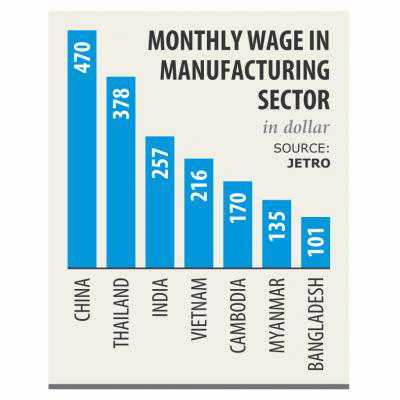Cheap labour continues to draw Japanese investment
19 November, 2018

The devastating terrorist attack in Dhaka in July 2016 that killed seven Japanese citizens could not dampen the Far East nation's attraction towards Bangladesh when it comes to trade and investment.
Since 2016, 24 new Japanese companies came to Bangladesh to take the tally to 269, according to data from the Japan External Trade Organisation (Jetro) in Dhaka.
Low wage and low cost of production are the main reasons for coming to Bangladesh, according to Daisuke Arai, country representative of Jetro, an organisation of the Japanese government that works to promote trade and investment with the rest of the world.
“In China the cost of production is four times higher than that in Bangladesh. Definitely, Bangladesh is a very competitive country for investment compared to other countries,” he told a group of journalists at his office in Dhaka yesterday.
Bangladesh is one of the major destinations although Japanese entrepreneurs are investing in Cambodia, Vietnam and Myanmar in areas of textile, IT and infrastructure.
So far, the amount of Japanese investment in Bangladesh by private companies is $326 million. However, the amount is much higher if the investments made by Japanese automobile giant Honda and Japan Tobacco are included.
In August this year, Japan Tobacco Inc agreed to purchase local Akij Group's tobacco business for $1.5 billion, which is the single largest FDI in Bangladesh's private sector so far.
Last week, Honda inaugurated its lone manufacturing plant at Munshiganj that it set up with state-owned Bangladesh Steel Engineering Corporation for Tk 230 crore.
If the amount of Japan state sponsored investment through Overseas Development Assistance (ODA) in different projects is included the amount is even bigger.
So far, the Japanese government has committed $12 billion as ODA and has already released $7 billion of the sum.
Many more Japanese investors are waiting to relocate their investment to Bangladesh because of the Japanese government's “China plus one” policy that was adopted in 2008 to reduce overdependence on China, especially for electronics and apparel items.
“We always advise them to invest in Bangladesh,” he said, adding that a lot of the work orders for apparel were shifted to the country from China.
Land acquisition for the special economic zone for Japanese investors has been completed, said Arai, also the president of the Japan Bangladesh Chamber of Commerce and Industry (JBCCI).
A company is scheduled to develop the land to get it ready for operation from December 2020. Arai went on to call for an end to customs and taxation harassment in Bangladesh, which the Japanese investors often complain about.
The problems listed by the Japanese companies in Bangladesh include difficulty in local procurement of raw materials and parts, inadequate logistics and infrastructure, difficulty in quality control and shortage of power.
Bangladesh has the longest lead-time in the seaways from Bangladesh to Japan compared to other Asian nations.
Currently, a vessel from Bangladesh requires 20.4 days to reach Japan, whereas it requires 5.8 days from Taiwan, 7.3 days from Vietnam, 9.5 days from Cambodia, 12.3 days from India and 14.6 days from Myanmar.
Even by air the lead time is the highest from Bangladesh. On an average it takes 8.7 days from Bangladesh to reach Japan, whereas from Myanmar it takes 5.3 days, India 4.7 days, Vietnam 3.1 days and from Cambodia 3.3 days.
Not just investment inflow Japan has also turned into the largest export destination for Bangladesh among the Asian nations.
Japan is the only country in Asia to which the exports crossed the $1 billion mark in the last three consecutive fiscal years.
Export earnings from Japan rose 11.73 percent to $1.13 billion last fiscal year, according to data from the Export Promotion Bureau. Of the amount $846.73 million -- which is 74.8 percent -- came from garment shipments.
Bangladesh has a lot of opportunities to send its skilled and semi-skilled workers to the Far East nation as the Japanese government has recently taken a decision to recruit foreign workers for five years with the opportunity to renew for another five years, Arai added.
TAG(s):
